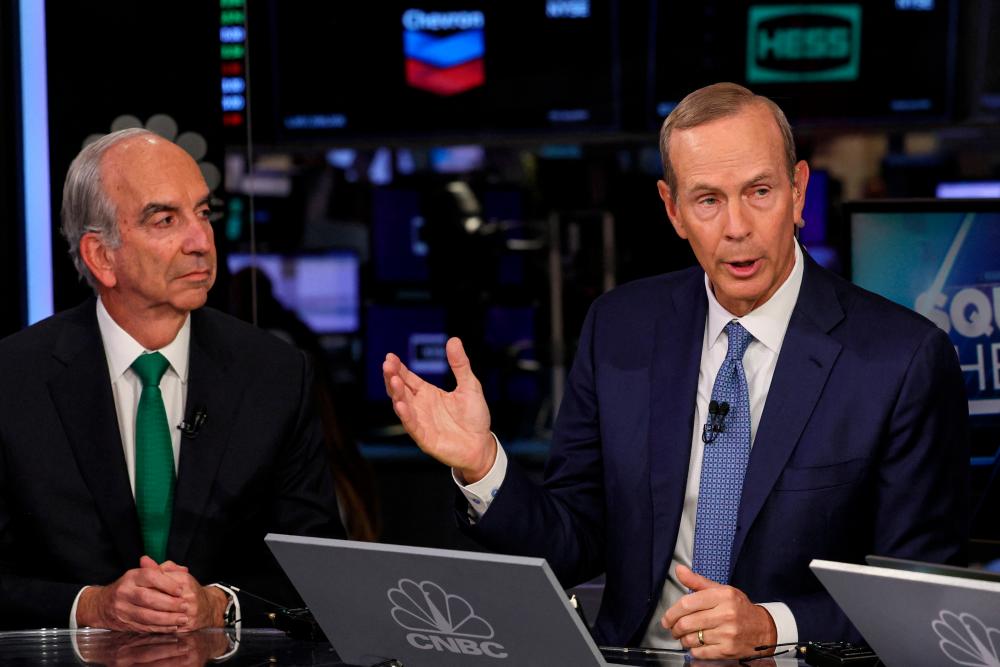HOUSTON: Chevron has agreed to buy Hess for US$53 billion (RM253.7 billion) in stock to gain a bigger US oil footprint and a stake in rival ExxonMobil’s massive Guyana discoveries, the latest in a series of blockbuster US oil combinations.
The Chevron deal announced on Monday (Oct 23) and a US$60 billion acquisition by Exxon earlier this month will add years of oil and gas production to the two top US producers’ portfolios, much of it from US shale. And the deals will leave European oil rivals that had shifted their focus to renewable energy further behind in fossil fuels.
“This is great for energy security: It brings together two great American companies,” said Chevron CEO Michael Wirth, who has bulked up the company’s shale oil and gas holdings by acquiring US rivals PDC Energy and Noble Energy.
The combination of Hess, PDC and Noble will bring Chevron’s total oil and gas output to about 3.7 million barrels per day (bpd). It will expand Chevron’s shale output by 40% to 1.3 million bpd, putting it neck and neck with Exxon’s projected shale output following its Pioneer Natural Resources acquisition.
The combined company will expand Chevron’s oil production in less risky regions by adding to its output in the US Gulf of Mexico and by bringing it into the Bakken shale in North Dakota.
The deal gives Chevron a 30% stake in the Exxon and CNOOC Stabroek oil block in Guyana, which is expected to triple to more than 1.2 million bpd by 2027.
“This deal is all about the world-class Guyana asset, which is by far the crown jewel in the Hess portfolio,” wrote Capital One Securities analysts in a note.
Guyana has emerged as one of the world’s fastest growing oil province following more than 11 billion barrels of oil and gas discoveries since 2015.
CEO John Hess said the government of Guyana and Exxon would welcome Chevron’s entry into the country's oil fields.
John Hess told Reuters he has been in talks with Wirth for about two years.
“We eventually talked about each other’s companies and the strategic fit,” Hess said.
The executives have known each other for many years, having previously been partners in US Gulf of Mexico fields, and regularly discussed their business, Wirth told Reuters.
“This is a discussion that goes back a number of years over a variety of conversations in person, on the phone and over dinners,” he said.
Goldman Sachs was the lead adviser to Hess while Morgan Stanley was the lead adviser to Chevron.
Chevron offered 1.025 of its shares for each Hess share, or about US$171 per share. The total deal value is US$60 billion, including debt.
The deal follows Exxon’s rapid-fire deals since July for top US shale producer Pioneer and Denbury. Those US$64 billion combined transactions put Exxon atop US shale and cemented the firm’s nascent carbon storage business.
RBC analysts said they were surprised by the deal timing, and had expected Chevron to bide its time after Exxon’s mega deal.
The deal faces regulatory reviews, but Wirth said he is not expecting anti-trust concerns.
He said the combined companies expect to generate about US$1 billion in cost synergies within a year of its closing.
Chevron said it would sell between US$15 billion and US$20 billion in assets and plans to spend between US$19 billion and US$21 billion a year on major projects after the deal closes.
Once the it closes around the first half of 2024, the Hess CEO will join Chevron's board of directors.
“We’ve got too many CEOs per BOE (barrels of oil equivalent), so consolidation is natural,” said Wirth, adding the world could expect to see other oil deals.
The recent oil deals are a financial flex by US oil and gas companies that have kept investing in fossil fuels as European rivals turned their attention to renewable fuels. Chevron and Exxon accumulated huge profits from strong energy prices and demand since Russia’s invasion of Ukraine.
Chevron said it tends to ramp up its share repurchases to the top of its US$20 billion annual range, if oil prices remain high, and will increase its annual shareholder dividend by 8%.
Chevron will increase buybacks by US$2.5 billion after the transaction, Wirth said.
“Shareholders of both companies will benefit from the stronger free cash flow that will more than double over the next five years,” he said. – Reuters









